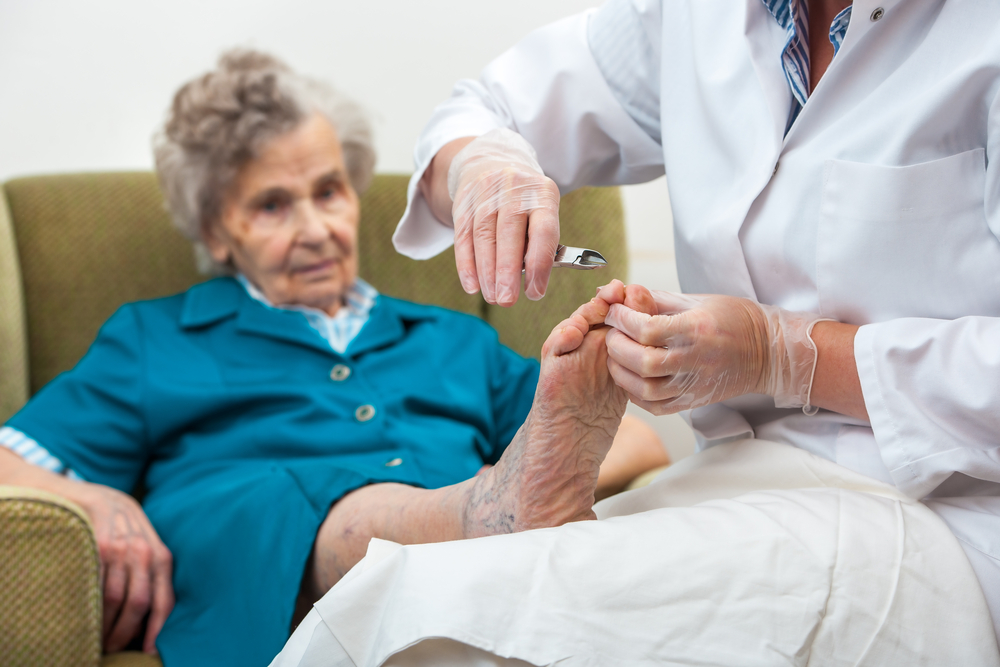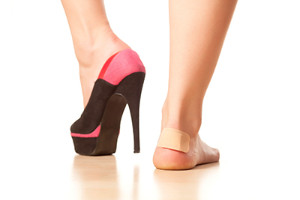
(616) 846-3400
Fax: (616) 846-3406

(616) 846-3400
Fax: (616) 846-3406
 If you notice a bony protrusion that may look like a permanent deformity on the side of your big toe, you may have what is known as a bunion. It may develop as a result of wearing shoes that do not have adequate room for the toes to move freely in, or possibly from a genetic trait. Some of the symptoms that are associated with this condition may be tenderness and swelling, in addition to burning or tingling sensations. If having this ailment interferes with wearing shoes and completing daily activities, many patients may choose to undergo surgery for permanent removal of the bunion. For less severe bunions, orthotics may be prescribed which may provide mild relief. If properly fitting shoes and socks are worn, painful and uncomfortable bunions may possibly be prevented. If you are affected by bunions, it is advised to speak to a podiatrist who can properly diagnosis and offer correct treatment techniques.
If you notice a bony protrusion that may look like a permanent deformity on the side of your big toe, you may have what is known as a bunion. It may develop as a result of wearing shoes that do not have adequate room for the toes to move freely in, or possibly from a genetic trait. Some of the symptoms that are associated with this condition may be tenderness and swelling, in addition to burning or tingling sensations. If having this ailment interferes with wearing shoes and completing daily activities, many patients may choose to undergo surgery for permanent removal of the bunion. For less severe bunions, orthotics may be prescribed which may provide mild relief. If properly fitting shoes and socks are worn, painful and uncomfortable bunions may possibly be prevented. If you are affected by bunions, it is advised to speak to a podiatrist who can properly diagnosis and offer correct treatment techniques.
If you are suffering from bunion pain, contact Dr. Robbi Young of Grand Haven Foot & Ankle. Our doctor can provide the care you need to keep you pain-free and on your feet.
What Is a Bunion?
Bunions are painful bony bumps that usually develop on the inside of the foot at the joint of the big toe. As the deformity increases over time, it may become painful to walk and wear shoes. Women are more likely to exacerbate existing bunions since they often wear tight, narrow shoes that shift their toes together. Bunion pain can be relieved by wearing wider shoes with enough room for the toes.
Causes
Symptoms
In order to diagnose your bunion, your podiatrist may ask about your medical history, symptoms, and general health. Your doctor might also order an x-ray to take a closer look at your feet. Nonsurgical treatment options include orthotics, padding, icing, changes in footwear, and medication. If nonsurgical treatments don’t alleviate your bunion pain, surgery may be necessary.
If you have any questions, please feel free to contact our office located in Grand Haven, MI . We offer the newest diagnostic and treatment technologies for all your foot care needs.
 Many elderly people may find it difficult to practice daily foot care. It’s important for seniors to wear shoes that fit comfortably, and this may prevent uncomfortable conditions from developing. These may include corns, calluses, bunions, or ingrown toenails. Research has shown the feet may change size or become wider, and it is recommended to measure them to determine the proper shoe size. Many seniors may spend the day sitting down, and poor circulation may gradually develop. This may be avoided by resisting the urge to cross the legs, in addition to frequently walking and performing gentle stretches. A common ailment that many elderly people notice is dry skin. Mild relief may be found when a moisturizer is applied several times per day. If you have questions about how to care for elderly feet, it is suggested to consult with a podiatrist.
Many elderly people may find it difficult to practice daily foot care. It’s important for seniors to wear shoes that fit comfortably, and this may prevent uncomfortable conditions from developing. These may include corns, calluses, bunions, or ingrown toenails. Research has shown the feet may change size or become wider, and it is recommended to measure them to determine the proper shoe size. Many seniors may spend the day sitting down, and poor circulation may gradually develop. This may be avoided by resisting the urge to cross the legs, in addition to frequently walking and performing gentle stretches. A common ailment that many elderly people notice is dry skin. Mild relief may be found when a moisturizer is applied several times per day. If you have questions about how to care for elderly feet, it is suggested to consult with a podiatrist.
Proper foot care is something many older adults forget to consider. If you have any concerns about your feet and ankles, contact Dr. Robbi Young from Grand Haven Foot & Ankle. Our doctor can provide the care you need to keep you pain-free and on your feet.
The Elderly and Their Feet
As we age we start to notice many changes in our body, but the elder population may not notice them right away. Medical conditions may prevent the elderly to take notice of their foot health right away. Poor vision is a lead contributor to not taking action for the elderly.
Common Conditions
Susceptible Infections
Diabetes and poor circulation can cause general loss of sensitivity over the years, turning a simple cut into a serious issue.
If you have any questions please feel free to contact our office located in Grand Haven, MI . We offer the newest diagnostic and treatment technologies for all your foot and ankle needs.
 Many women choose to wear high heels to enhance the lines of the legs and feet. Research has shown there may be disadvantages to wearing this type of shoe, which may include potential damage to different parts of the foot. If you have a bunion, it may become worse while wearing high heels. This may be a result of limited room in the toe area of the shoe, which may put excess pressure on the toes. Many patients experience ingrown toenails from wearing high heels. This may be due to having inadequate room for the toes to move freely in. Additionally, the risk of falling may increase from wearing high heels, and this may lead to other painful conditions. If you would like additional information about how high heels affect the feet, please consult with a podiatrist.
Many women choose to wear high heels to enhance the lines of the legs and feet. Research has shown there may be disadvantages to wearing this type of shoe, which may include potential damage to different parts of the foot. If you have a bunion, it may become worse while wearing high heels. This may be a result of limited room in the toe area of the shoe, which may put excess pressure on the toes. Many patients experience ingrown toenails from wearing high heels. This may be due to having inadequate room for the toes to move freely in. Additionally, the risk of falling may increase from wearing high heels, and this may lead to other painful conditions. If you would like additional information about how high heels affect the feet, please consult with a podiatrist.
High heels have a history of causing foot and ankle problems. If you have any concerns about your feet or ankles, contact Dr. Robbi Young from Grand Haven Foot & Ankle. Our doctor can provide the care you need to keep you pain-free and on your feet.
Effects of High Heels on the Feet
High heels are popular shoes among women because of their many styles and societal appeal. Despite this, high heels can still cause many health problems if worn too frequently.
Which Parts of My Body Will Be Affected by High Heels?
What Kinds of Foot Problems Can Develop from Wearing High Heels?
How Can I Still Wear High Heels and Maintain Foot Health?
If you want to wear high heeled shoes, make sure that you are not wearing them every day, as this will help prevent long term physical problems. Try wearing thicker heels as opposed to stilettos to distribute weight more evenly across the feet. Always make sure you are wearing the proper shoes for the right occasion, such as sneakers for exercising. If you walk to work, try carrying your heels with you and changing into them once you arrive at work. Adding inserts to your heels can help cushion your feet and absorb shock. Full foot inserts or metatarsal pads are available.
If you have any questions please feel free to contact our office located in Grand Haven, MI . We offer the newest diagnostic and treatment technologies for all your foot and ankle needs.
The ailment that is known as plantar hyperhidrosis is a medical condition that affects the feet. When the feet sweat profusely, it may cause discomfort and embarrassment. Patients who are afflicted with this condition may have difficulty in keeping shoes and socks dry, which may lead to an unpleasant odor. Research has indicated that genetic factors may play a significant role in the development of overactive sweat glands. Other conditions may arise as a result of this condition, including athlete’s foot and toenail fungus. Mild relief may be found when the feet are washed daily, with extra emphasis placed on drying the feet thoroughly, especially in between the toes. Additionally, it may be beneficial to choose shoes that are made of breathable materials, which may include leather or canvas. If plantar hyperhidrosis is affecting many of your daily activities, it is suggested to speak with a podiatrist who can recommend treatment options that are correct for you.
If you are suffering from hyperhidrosis contact Dr. Robbi Young of Grand Haven Foot & Ankle. Our doctor can provide the care you need to attend to all of your foot and ankle needs.
Hyperhidrosis of the Feet
Hyperhidrosis is a rare disorder that can cause people to have excessive sweating of their feet. This can usually occur all on its own without rigorous activity involved. People who suffer from hyperhidrosis may also experience sweaty palms.
Although it is said that sweating is a healthy process meant to cool down the body temperature and to maintain a proper internal temperature, hyperhidrosis may prove to be a huge hindrance on a person’s everyday life.
Plantar hyperhidrosis is considered to be the main form of hyperhidrosis. Secondary hyperhidrosis can refer to sweating that occurs in areas other than the feet or hands and armpits. Often this may be a sign of it being related to another medical condition such as menopause, hyperthyroidism and even Parkinson’s disease.
In order to alleviate this condition, it is important to see your doctor so that they may prescribe the necessary medications so that you can begin to live a normal life again. If this is left untreated, it is said that it will persist throughout an individual’s life.
A last resort approach would be surgery, but it is best to speak with your doctor to find out what may be the best treatment for you.
If you have any questions please feel free to contact our office located in Grand Haven, MI . We offer the newest diagnostic and treatment technologies for all your foot and ankle needs.